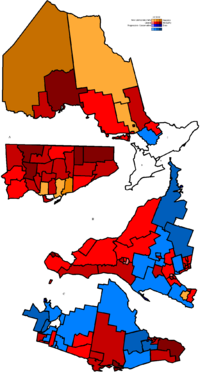Ontario general election, 2003
|
|
|||||||||||||||||||||||||||||||||||||||||||||||||||||||||||
|
|||||||||||||||||||||||||||||||||||||||||||||||||||||||||||
|
|||||||||||||||||||||||||||||||||||||||||||||||||||||||||||
|
|
|||||||||||||||||||||||||||||||||||||||||||||||||||||||||||
| The Ontario Legislature after the 2003 election. | |||||||||||||||||||||||||||||||||||||||||||||||||||||||||||
|
|||||||||||||||||||||||||||||||||||||||||||||||||||||||||||
Ernie Eves
Progressive Conservative
The Ontario general election of 2003 was held on October 2, 2003, to elect the 103 members of the 38th Legislative Assembly (Members of Provincial Parliament, or "MPPs") of the Province of Ontario, Canada.
The election was called on September 2 by Premier Ernie Eves to capitalize on an increase in support for the governing Ontario Progressive Conservative Party in the days following the 2003 North American blackout. The election was won, however, by the Ontario Liberal Party, led by Dalton McGuinty.
In 1995, the Ontario Progressive Conservative Party or "Tories" under Mike Harris came from third place to upset the front-running Ontario Liberal Party under Lyn McLeod and the highly unpopular governing Ontario New Democratic Party under Bob Rae to form a majority government. The Harris government was far more activist than earlier Ontario PC governments, and over the next two terms moved to cut personal income tax rates by 30%, closed almost 40 hospitals to increase efficiency, cut the Ministry of the Environment staff in half, and undertook massive reforms of the education system including mandatory teacher testing and student testing in public education and public tax credits for parents who sent their children to private schools.
...
Wikipedia



